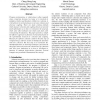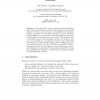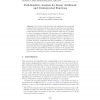4959 search results - page 147 / 992 » Imperative Functional Programming |
112
Voted
SERP
2004
15 years 3 months ago
2004
Program restructuring or refactoring is often required when a function becomes too large or is involved in multiple activities and therefore exhibits low cohesion. A critical fact...
116
click to vote
ICALP
2000
Springer
15 years 6 months ago
2000
Springer
Abstract. We describe SAFL, a call-by-value first-order functional language which is syntactically restricted so that storage may be statically allocated to fixed locations. Evalua...
111
click to vote
SAS
2004
Springer
15 years 7 months ago
2004
Springer
We describe data structures and algorithms for performing a path-sensitive program analysis to discover equivalences of expressions involving linear arithmetic or uninterpreted fun...
118
Voted
IFL
1997
Springer
15 years 6 months ago
1997
Springer
Common subexpression elimination is a well-known compiler optimisation that saves time by avoiding the repetition of the same computation. In lazy functional languages, referential...
191
click to vote
GPEM
2011
14 years 9 months ago
2011
In this paper we demonstrate how genetic algorithms can be used to reverse engineer an evaluation function’s parameters for computer chess. Our results show that using an appropr...



